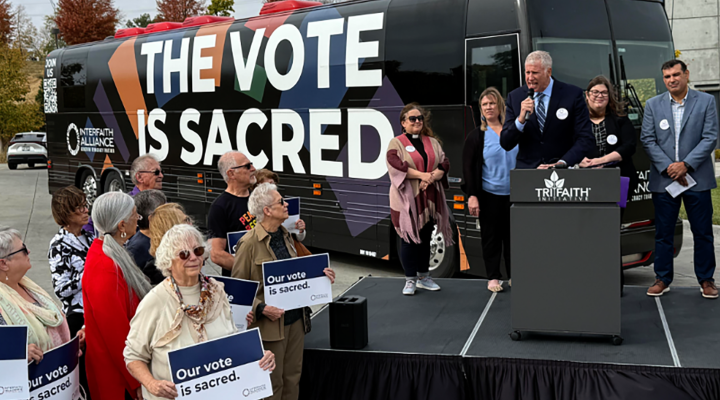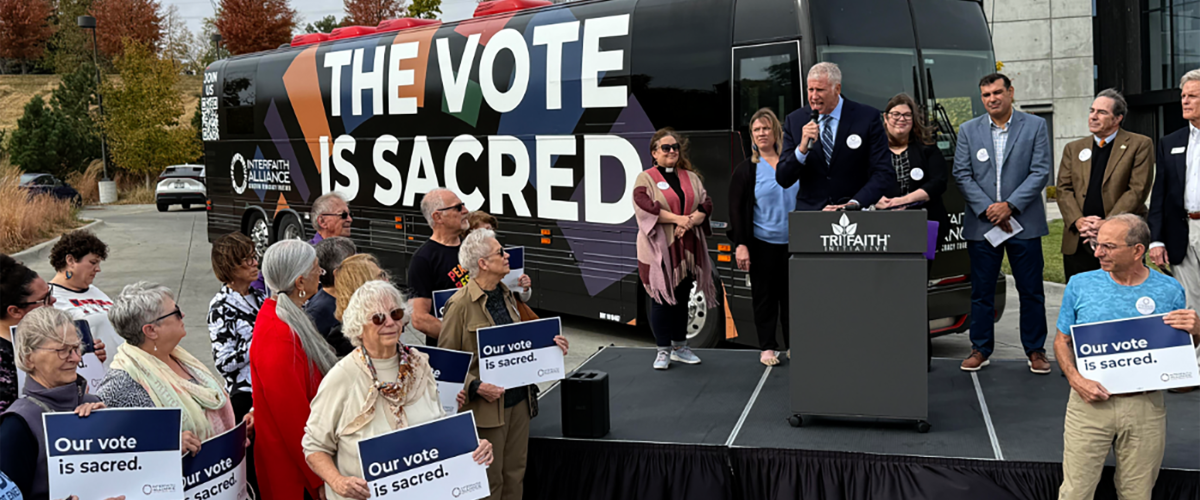Interfaith Alliance launched a cross-country bus tour Oct. 28 to remind Americans voting is a civic and holy undertaking.
“I’m kicking off this moment to declare that the vote is sacred, and not just for some people in this country, but for everyone in this country,” President Paul Raushenbush said to begin the “The Vote Is Sacred Bus Tour” in Omaha, Neb.
The goal of the eight-day ride from Omaha to Philadelphia, with multiple stops along the way, is to fight the Christian nationalism that has inspired its adherents’ yearning to replace democracy with theocratic and autocratic rule.
“In this moment when there are some who want to suppress the vote and to intimidate the vote, we are saying the vote is sacred, it is precious, we must use it,” Raushenbush said.
Billed as a nonpartisan campaign to defend a pluralistic and multifaith democracy, the trek will encourage religious communities and people of no faith to help increase voter turnout and to ensure the safety of election workers in Nebraska, Iowa, Wisconsin, Michigan, Ohio and Pennsylvania.
“We are making sure we are not ceding the idea of religious communities showing up for this moment to those who would use religion as a bludgeon instead of a bridge,” he explained. “We are not ceding religion to those who would use religion as a way to discriminate rather than to celebrate.”
The tour coincides with similar ongoing projects aimed at confronting Christian nationalism and promoting faith and democracy, Raushenbush noted in an Oct. 26 installment of the “State of Belief” podcast: “This fall, a number of faith-and-values-driven organizations have taken to the road, bringing a positive message to communities across the country aboard colorful activist-filled buses from the nuns on the bus and friends vote.”
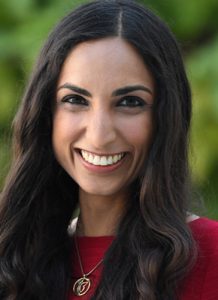
Valarie Kaur
The podcast included interviews with filmmaker and activist Valarie Kaur, pastor and social activist Doug Pagitt, and historian and author Kristin Du Mez about the events they are hosting to promote the values of compassion and democracy in a nation enamored with racism and authoritarianism.
“This bus is a practice space for the world as it could be,” said Kaur, a civil rights leader and author of Sage Warrior: Wake to Oneness, Practice Pleasure, Choose Courage, Become Victory.
Her “Revolutionary Love Bus Tour” is a six-week endeavor launched in September with more than 40 stops from California to North Carolina and concluding Nov. 7 in New Orleans.
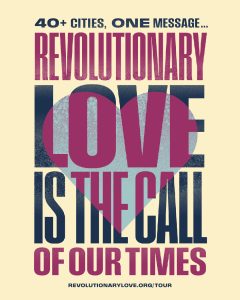 “We’re gathering people to ignite love and courageous action in a time when the world feels like it’s on fire,” she said. “We have found beloved community is not the absence of conflict, it’s showing up with wonder for each other and caring for each other and struggling with each other.”
“We’re gathering people to ignite love and courageous action in a time when the world feels like it’s on fire,” she said. “We have found beloved community is not the absence of conflict, it’s showing up with wonder for each other and caring for each other and struggling with each other.”
The tour also emphasizes that actively supporting multi-racial democracy is a sacred task.
“We are tired of a culture that makes us choose sides,” she said. “We want to stand on the side of humanity. We want to feel connected. We want to feel permission to feel joy. We want to be together. We want to be together as human beings.”
Pagitt’s “Faith Hope and Love” tour kicked off Oct. 28 with plans to hold seminars on Christian nationalism in more than 10 U.S. cities beginning in La Crosse, Wis., and concluding in Washington, D.C. on election day.
In similar sessions held previously, Vote Common Good has regularly encountered people who mistake opposition to Christian nationalism as opposition to Christianity or Christian participation in the public square, said Pagitt, executive director of Vote Common Good.
This bus tour seeks to inform Americans that opposing Christian nationalism means opposing any form of government that privileges certain Christians or receives its authority from those acting on behalf of Christianity.
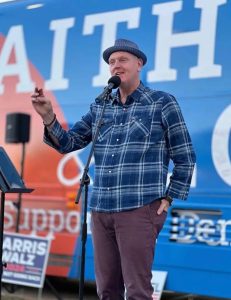
Doug Pagitt
“And once we have people understanding the true threat of Christian nationalism and what the intention of Christian nationalists are — which is to have the government do their bidding, to have the government give them special privilege and to tell people that the government actually receives its own governmental authority from Christianity — then people tend to come around and say, ‘yeah, I think Christian nationalism would be a problem,’” Pagitt said.
Meanwhile, the “Faith and Democracy” tour features church-hosted events led by Du Mez and fellow politics, culture and religion experts Diana Butler Bass, Jemar Tisby and Robert P. Jones, co-hosts of “The Convocation Unscripted.”
So far, the group has held sessions at First Baptist Church in Greensboro, N.C., and Dayspring United Methodist Church in Tempe, Ariz.
“We sensed the need around the country for people of faith to connect into these networks, to educate folks, but also to empower them and to inspire them that there is something that they can do, and to equip them,” said Du Mez, professor of gender, religion and politics at Calvin University and author of the bestselling book Jesus and John Wayne.
Musical artists have been included in the gatherings to connect songs with the pro-democracy movements just as leaders of the Civil Rights Movement did decades ago.
“If you listen to people who were there in the Civil Rights Movement, it was never without music,” Raushenbush observed. “Music was a part of it, and it’s important to recognize how important music is in this movement.”
Duz Mez said she and her colleagues wanted to use the tour to make a positive theological case for defending democracy in this moment. “We can look to the Black church and to the Civil Rights Movement because for those of us white Christians in this fight, it’s easy to get discouraged.”

